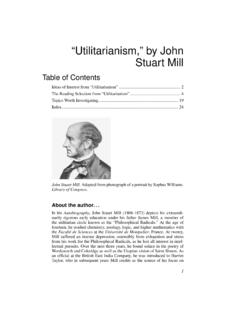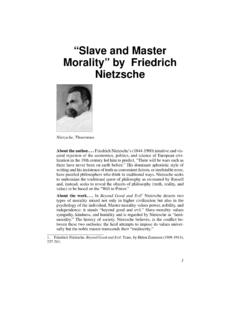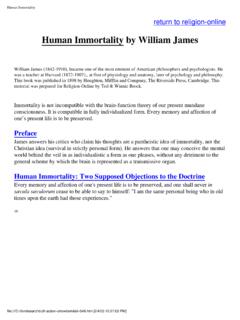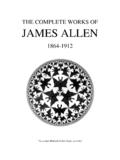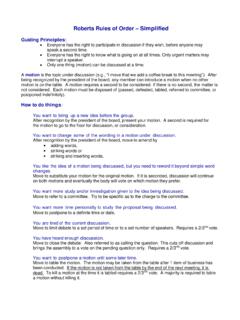Transcription of “The Will to Believe” by William James
1 The Will to Believe byWilliam JamesWilliam James , ThoemmesAbout the author.. William James (1842-1909), both a philosopher anda psychologist, was an early advocate of pragmatism. He thought that a be-lief is true insofar as it works, is useful, or satisfies a function. On thistheory, truth is thought to be found in experience, not in judgments aboutthe world. James had a most profound arrest of life one quite simi-lar to Tolstoy s as described in the first section of these readings. WhileTolstoy s solution to his personal crisis was spiritual, James advocated thedevelopment of the power of the individual self.
2 In this effort, James ex-erted a greater influence on twentieth century existential European thoughtthan he did on twentieth century American the work..In hisWill to Believe and Other Essays,1 James arguesthat it is not unreasonable to believe hypotheses that cannot be known orestablished to be true by scientific investigation. When some hypothesesof ultimate concern arise, he argues that our faith can pragmatically shapefuture outcomes. Much as in Pascal s Wager, by not choosing, he thinks,we lose possibility for meaningful Will to Believe and Other Essays. London: Longmans, Green,and Co.
3 , The Will to Believe by William JamesFrom the reading.. He who refuses to embrace a unique opportunity loses the prize ascertainly as surely as if he tried and failed. Ideas of Interest fromThe Will explain James genuine option theory. In his characteriza-tion of three types of options, does James commit the fallacy of falsedichotomy? can one be sure an option is momentous? Is is possible somemomentous options are not evident to us at the time they occur inour lives? Is is possible for us to obtain a second chance to decide amomentous option? Can you construct necessary and sufficient con-ditions2for an option to be a momentous one?
4 Applies his theory to morals, social relations, and religion. Arethere any other dimensions of living which should be included? Whycannot the genuine option theory be applied to the scientific method?How is option theory applied to the problem of free will? whether or not acceptance of the genuine option theory andJames thesis, itself, is a momentous option in a person s life. Couldsuch a decision be related to the philosophy of existentialism? necessary condition is a factor in the absence of which a specific event cannottake place. A necessary condition isindispensableor isessentialfor some other event tooccur.
5 For example, the presence of oxygen is a necessary condition for a fire to conditionxis necessary for conditiony, if wheneverxdoes not occur, thenydoesnot occur. A sufficient condition is that factor in the presence of which an event alwaysoccurs. A sufficient condition is alwaysenoughfor some other event to occur. For exam-ple, in the , having ten dimes is sufficient for having a dollar, but having ten dimesis not necessary to have a dollar because one could also have a dollar by having fourquarters. Subjunctively, a sufficient condition can be expressed in the formula, If factorpshould occur, then factorqwould also occur.
6 This subjunctive conditional statementalso expressesqas a dispositional property For Philosophical Inquiry: A Brief Introduction The Will to Believe by William you construct an example where James thesis is false? , is itpossible for our passional nature to decide an option which cannot bedecided on intellectual grounds and have a disastrous result?The Reading Selection fromThe Willto Believe[Hypotheses and Options].. Let us give the name of hypothesis to anything that may be proposedto our belief; and just as the electricians speak of live and dead wires,let us speak of any hypothesis as either live or dead.
7 A live hypothesis isone which appeals as a real possibility to him to whom it is proposed. IfI ask you to believe in the Mahdi, the notion makes no electric connec-tion with your nature it refuses to scintillate with any credibility at an hypothesis it is completely dead. To an Arab, however (even if hebe not one of the Mahdi s followers), the hypothesis is among the mind spossibilities: It is alive. This shows that deadness and liveness in an hy-pothesis are not intrinsic properties, but relations to the individual are measured by his willingness to act. The maximum of liveness inan hypothesis means willingness to act irrevocably.
8 Practically, that meansbelief; but there is some believing tendency wherever there is willingnessto act at , let us call the decision between two hypotheses an option. Optionsmay be of several kinds. They may be (1) living or dead, (2) forced oravoidable, (3) momentous or trivial; and for our purposes we may call anoption a genuine option when it is of the forced, living, and A living option is one in which both hypotheses are live ones. If I sayto you, Be a theosophist, or be a Mohammedan, it is probably a deadoption, because for you neither hypothesis is likely to be alive. But if Isay, Be an agnostic or be a Christian, it is otherwise: Trained as you are,each hypothesis makes some appeal, however small, to your For Philosophical Inquiry: A Brief Introduction3 The Will to Believe by William JamesFridtjof Nansenand theFramin the North Atlantic, from Fridtjof Nansen,Farthest North, Harper & Bros.
9 , 1897 Nansen s account of the polar ex-pedition of Next, if I say to you, Choose between going out with your umbrella orwithout it, I do not offer you a genuine option, for it is not forced. Youcan easily avoid it by not going out at all. Similarly, if I say, Either loveme or hate me, Either call my theory true or call it false, your optionis avoidable. You may remain indifferent to me, neither loving nor hating,and you may decline to offer any judgment as to my theory. But if I say, Either accept this truth or go without it, I put on you a forced option, forthere is no standing place outside of the alternative.
10 Every dilemma basedon a complete logical disjunction, with no possibility of not choosing, isan option of this forced Finally, if I were Dr. Nansen and proposed to you to join my NorthPole expedition, your option would be momentous; for this would prob-ably be your only similar opportunity, and your choice now would eitherexclude you from the North Pole sort of immortality altogether or put atleast the chance of it into your hands. He who refuses to embrace a uniqueopportunity loses the prize as surely as if he tried and contrathe option is trivial when the opportunity is not unique, when the stake isinsignificant, or when the decision is reversible if it later prove trivial options abound in the scientific life.


